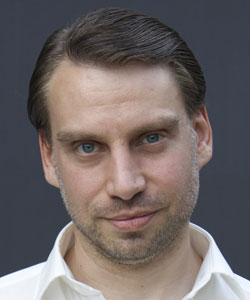Wolfgang Gaissmaier
 Max Planck Institute for Human Development, Harding Center for Risk Literacy, Germany
Max Planck Institute for Human Development, Harding Center for Risk Literacy, Germany
www.mpib-berlin.mpg.de/en/staff/wolfgang-gaissmaier
What does your research focus on?
Broadly speaking, I study how people make decisions under risk and uncertainty. How do people perceive and interpret risk and uncertainty? How do they actually make decisions given that they have limited time and limited cognitive capacities? And how could they make better, more informed decisions? To address these questions, I take on a cognitive-ecological perspective, which sees decision making as an interaction between the human mind and its core cognitive capacities on the one hand, and the structure of the physical and social environment on the other. My work spans from basic research to actual applications, the latter focusing primarily on the health sector. It builds on a combination of laboratory experiments, cognitive modeling, and simulation, as well as surveys and field studies.
What drew you to this line of research and why is it exciting to you?
In the beginning, I think it was simply a social heuristic that drew me to this line of research: If you see people who are really enthusiastic about the topic they are studying, consider this topic to be interesting. Gerd Gigerenzer is such an enthusiastic person, and when we first met at a seminar on decision making he was organizing at the Free University Berlin, it became very clear to me soon that I wanted to work with him on such topics for my dissertation. Of course I still needed to convince him as well. Now we have been working together for more than a decade. What I love about this line of research is that it is about real issues that concern every one of us very closely. It deals with the big questions, such as rationality, but also with very practical things, such as how people make decisions about their health. It intersects with many other disciplines, such as economics, medicine, biology, and so forth. And it is something that I can explain to my grandmother.
Who were/are your mentors or scientific influences?
This would clearly be my doctoral advisors Gerd Gigerenzer and Lael Schooler. I would not be where I am and who I am without them. They have become much more like family to me rather than being ‘just’ colleagues, and I still seek their advice in important questions. Among the many things they have taught me, probably the most important one is to ask the right questions at each point in a research project: Why is this an interesting research question in the first place? Can we explain it to an outsider? Is there a theory in shooting distance? Why would a reader continue reading the article at this point?
What’s your future research agenda?
I’d like to continue working out a comprehensive framework of decision making under risk and uncertainty, which includes models of risk perception and communication, decision strategies, and the environment (primarily regarding its social and institutional aspects). Moreover, I’ll further the applications of my research in the health domain to real-world settings, including medical education and schools. Finally, I want to expand the areas of application of my work to other risky domains, such as financial and environmental decision making. In both of those fields there is a need for better risk communication and better decisions.
What publication are you most proud of?
Gigerenzer, G., Gaissmaier, W., Kurz-Milcke, E., Schwartz, L. M., & Woloshin, S. (2007). Helping doctors and patients make sense of health statistics. Psychological Science in the Public Interest, 8, 53–96.
It may not be strategically smart to name a publication on which I am not the first author, but this paper is probably the best and most influential article that I have had the honor to contribute to. It is both broad and deep; does not only discuss the understanding of risk from a psychological perspective, but also deals with educational opportunities and challenges, institutional obstacles, and historical origins. What makes me particularly happy about this article is that many people who do not do research in this area told us how useful it was for them, personally.





APS regularly opens certain online articles for discussion on our website. Effective February 2021, you must be a logged-in APS member to post comments. By posting a comment, you agree to our Community Guidelines and the display of your profile information, including your name and affiliation. Any opinions, findings, conclusions, or recommendations present in article comments are those of the writers and do not necessarily reflect the views of APS or the article’s author. For more information, please see our Community Guidelines.
Please login with your APS account to comment.